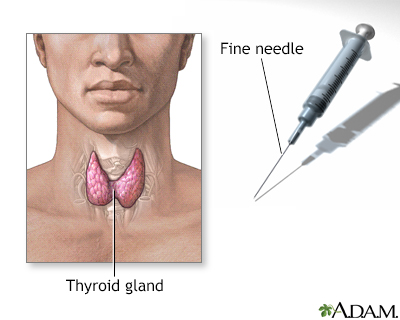Pregnancy SmartSiteTM
Thyroid adenoma - nodule; Thyroid carcinoma - nodule; Thyroid cancer - nodule; Thyroid incidentaloma; Hot nodule; Cold nodule; Thyrotoxicosis - nodule; Hyperthyroidism - nodule DefinitionA thyroid nodule is a growth (lump) in the thyroid gland. The thyroid gland is located at the front of the neck, just above where your collarbones meet in the middle. CausesThyroid nodules are caused by an overgrowth of cells in the thyroid gland. These growths can be:
Thyroid nodules are very common. They occur more often in women than in men. A person's chance of getting a thyroid nodule increases with age. Only a few thyroid nodules are due to thyroid cancer. A thyroid nodule is more likely to be cancer if you:
Causes of thyroid nodules are not always found, but can include:
SymptomsMost thyroid nodules do not cause symptoms. Large nodules can press against other structures in the neck. This can cause symptoms such as:
Nodules that produce thyroid hormones will likely cause symptoms of an overactive thyroid gland, including:
Older people with a nodule that produces too much thyroid hormone may have only vague symptoms, including:
Thyroid nodules are sometimes found in people who have Hashimoto disease. Hashimoto disease may cause symptoms of an underactive thyroid gland, such as:
Very often, thyroid nodules produce no symptoms. Health care providers often find thyroid nodules during a routine physical exam or imaging tests that are done for another reason. A few people have thyroid nodules that are big enough that they notice the nodule on their own and ask their provider to examine their neck. Exams and TestsIf your provider finds a nodule or you have symptoms of a nodule, the following tests may be done:
TreatmentYour provider may recommend surgery to remove all or part of your thyroid gland if the nodule is:
People with nodules that are making too much thyroid hormone may be treated with radioiodine therapy. This reduces the size and activity of the nodule. Pregnant women or women who are still breastfeeding are not given this treatment. Both surgery to remove thyroid gland tissue and radioactive iodine treatment can cause lifelong hypothyroidism (underactive thyroid). This condition needs to be treated with thyroid hormone replacement (a daily medicine). For noncancerous nodules that do not cause symptoms and are not growing, the best treatment may be:
Outlook (Prognosis)Noncancerous thyroid nodules are not life threatening. Many do not require treatment. Follow-up exams are enough. The outlook for thyroid cancer depends on the type of cancer. For the most common kinds of thyroid cancer, the outlook is very good after treatment. When to Contact a Medical ProfessionalContact your provider if you feel or see a lump in your neck, or if you have any symptoms of a thyroid nodule. If you have been exposed to radiation in the face or neck area, contact your provider. A neck ultrasound can be done to look for thyroid nodules. ReferencesHaugen BR, Alexander EK, Bible KC, et al. 2015 American Thyroid Association management guidelines for adult patients with thyroid nodules and differentiated thyroid cancer: The American Thyroid Association Guidelines Task Force on Thyroid Nodules and Differentiated Thyroid Cancer. Thyroid. 2016;26(1):1-133. PMID: 26462967 pubmed.ncbi.nlm.nih.gov/26462967/. Paschke R, Eszlinger M, Kopp P. Euthyroid and hyperthyroid nodules and goiter. In: Robertson RP, ed. DeGroot's Endocrinology. 8th ed. Philadelphia, PA: Elsevier; 2023:chap 77. Pearce EN, Hollenberg AN. Thyroid. In: Goldman L, Cooney KA, eds. Goldman-Cecil Medicine. 27th ed. Philadelphia, PA: Elsevier; 2024:chap 207. | ||
| ||
Review Date: 5/20/2024 Reviewed By: Sandeep K. Dhaliwal, MD, board-certified in Diabetes, Endocrinology, and Metabolism, Springfield, VA. Also reviewed by David C. Dugdale, MD, Medical Director, Brenda Conaway, Editorial Director, and the A.D.A.M. Editorial team. View References The information provided herein should not be used during any medical emergency or for the diagnosis or treatment of any medical condition. A licensed medical professional should be consulted for diagnosis and treatment of any and all medical conditions. Links to other sites are provided for information only -- they do not constitute endorsements of those other sites. No warranty of any kind, either expressed or implied, is made as to the accuracy, reliability, timeliness, or correctness of any translations made by a third-party service of the information provided herein into any other language. © 1997- A.D.A.M., a business unit of Ebix, Inc. Any duplication or distribution of the information contained herein is strictly prohibited. | ||


 Thyroid gland biop...
Thyroid gland biop...
